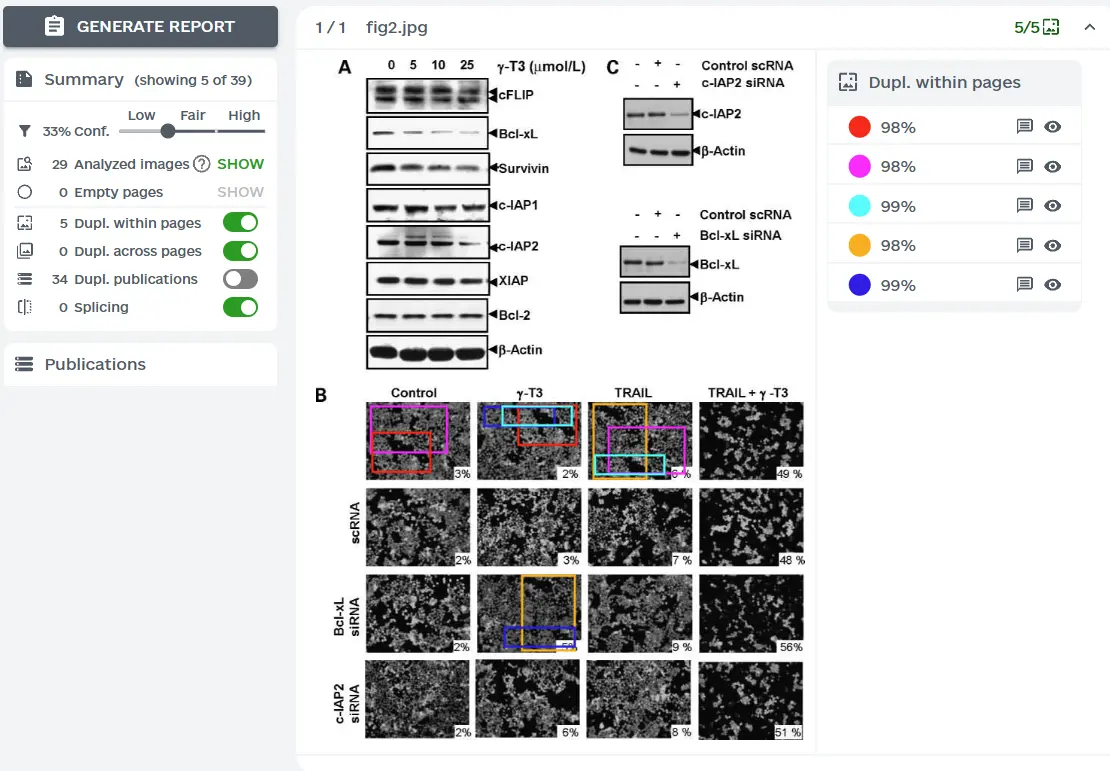Integrity Image Checks for Publishers
Imagetwin helps publishers uphold research integrity by efficiently detecting image integrity issues, including manipulations, duplications, plagiarism and AI-generated content.




Complete a pre-publication image check to identify and address issues early, and maintain the credibility of your journals
Utilize bulk scanning capabilities to efficiently analyze thousands of manuscripts
We continuously update to counter new falsification techniques, ensuring protection against emerging misconduct
Solution for Publishers
Imagetwin empowers publishers, journal editors, and peer-review teams to uphold the highest standards of research integrity by detecting and preventing:
- Inappropriate Image Duplication - Identify within-manuscript and cross-publication duplications before they reach publication.
- AI-Generated Images - Detect synthetic visuals that could compromise research authenticity. (Beta Feature)
- Publication Image Manipulation - Flag splicing, copy-move forgeries, contrast adjustments, and other alterations that may distort scientific findings.
- Publication Image Plagiarism in Scientific Journals - Compare figures against 115+ million published images to identify unauthorized reuse.

Why Image Integrity is Critical for Publishers
Many image integrity issues, such as duplications, manipulations, and AI-generated images, are difficult to detect manually and can undermine the credibility of published research.
Ensuring image integrity protects not just individual articles but also the impact factor rankings of a journal, which influence credibility within the scientific community.
Publishing compromised research can lead to costly retractions, reputational damage, and a loss of public trust in scientific journals.
Features Tailored for Publishers
Efficiently analyze millions of papers to detect integrity issues at scale.
Utilize advanced forensic tools to delve into complex investigations, ensuring thorough analysis of flagged content.
Seamlessly integrate Imagetwin into your existing workflows through our API, enhancing efficiency in the publication process.
Create your own database of research articles and automatically compare new submissions with your repository to detect image duplicates.
Generates a detailed summary of all detected integrity concerns in a structured PDF report
Equip your teams with hands-on training sessions to ensure seamless adoption of tools, improving efficiency and accuracy.
Do You Have Any Questions?
Let us know, and we are happy to get in touch.

Do you offer a free trial for publishers?
Yes, we provide a free trial to publishers. Please contact us using your corporate email to initiate the trial.
How can we use the API?
Detailed instructions on utilizing Imagetwin’s API are available in our documentation. For additional assistance, our technical support team is ready to help.
Do you offer high-volume plans?
Yes, we offer tailored solutions for high-volume use cases. Please contact us to learn more about our customized plans.
How does Imagetwin detect plagiarism in scientific journals?
Imagetwin compares submitted manuscripts against a vast database of over 100 million published figures to identify unauthorized image reuse and potential plagiarism, ensuring the originality of content in scientific journals. Imagetwin’s database is regularly updated with newly published scientific images, ensuring comprehensive coverage for integrity checks.
Can Imagetwin perform pre-publication image checks?
Absolutely. Imagetwin is designed to conduct pre- and post-publication tools for image integrity, helping to identify and address potential issues early in the review process.
How does Imagetwin help prevent fraudulent submissions from paper mills?
Imagetwin can detect suspicious patterns in images that align with known paper mill practices, helping publishers identify and reject fraudulent submissions before they reach publication.
Does Imagetwin integrate with peer-review platforms?
Yes, Imagetwin integrates seamlessly with major peer-review and publishing workflows, allowing publishers to automate pre-publication image checks.
What security measures does Imagetwin use to protect publisher data?
All uploaded manuscripts are fully encrypted, and no data is added to our global dataset, ensuring compliance with publication ethics and confidentiality standards.